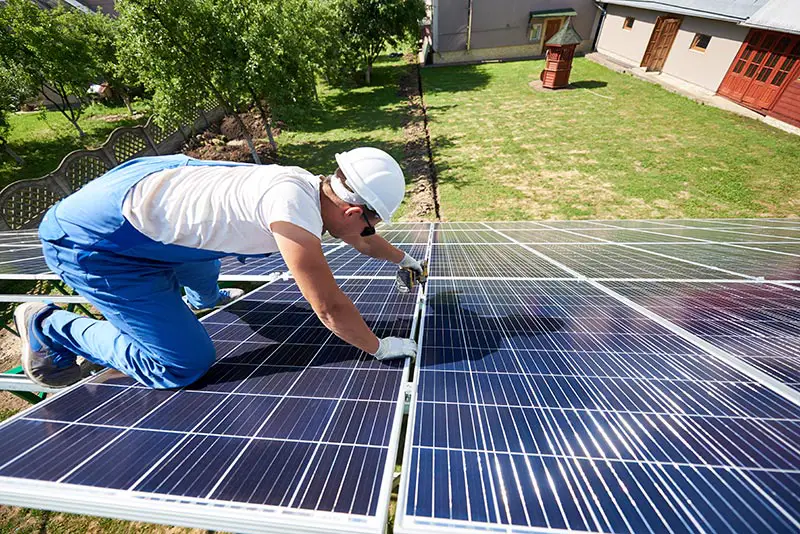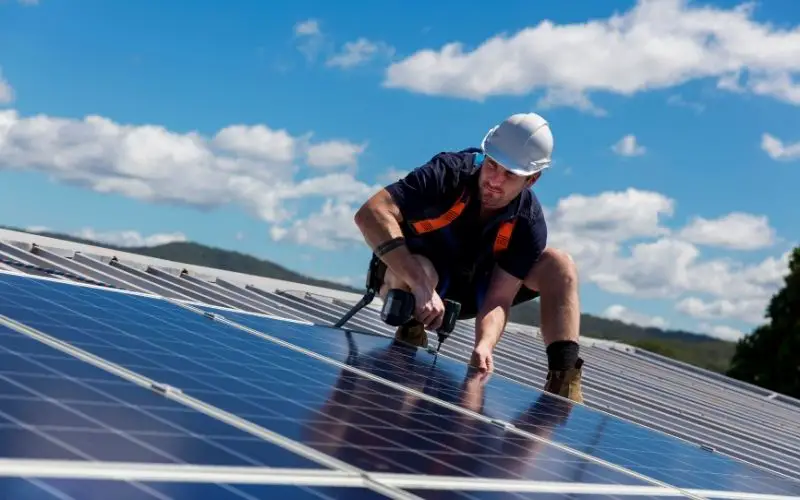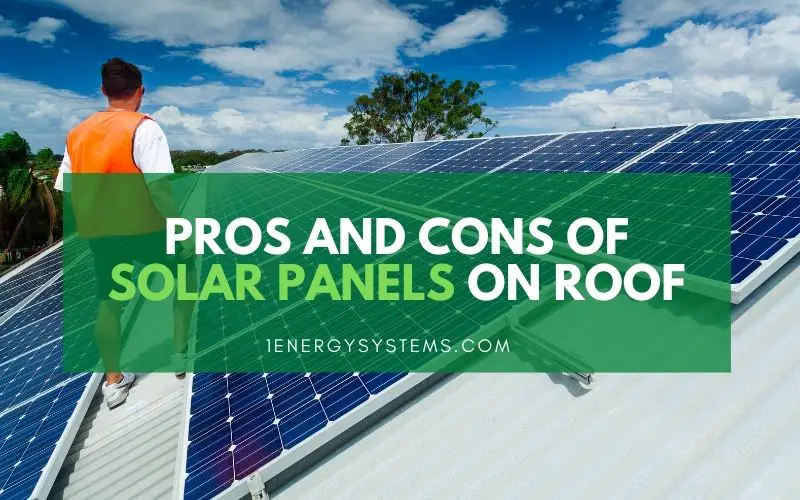Your reasons for going solar may be altruistic or economical but alternative energy lovers never had it this good ever.
Advances in technology have made home solar installations more efficient, less expensive, and easier to install. Federal, state, and local authorities are chipping in with a slew of incentives. Deals, offers, and discounts are pouring in from manufacturers, solar companies, and local dealers.
As they say, Carpe diem! Or Seize the Day!
Even as you get to save on your utility bills and avail of federal tax credits, you can also do your bit for the environment by adopting clean and green energy. Renewable and sustainable, solar energy can help you cut down on carbon emissions. One of the best points about solar energy is that it is free, abundant, and available in almost all parts of the world.
Even as you acknowledge the benefits of solar energy, you are justified in having second thoughts about fixing them on your roof. How will they affect the durability and longevity of the roof? Does it entail more upkeep? Will they end up damaging the roof? Are there any benefits of solar panels on roof?
All your concerns are valid and they need to be addressed comprehensively. You need to be reassured and feel confident before going ahead with your solar purchase.
This article attempts to help you gain clarity on the pros and cons of solar roofing.
Will solar roofing impact the durability of roofs?
This is one of the most important questions faced by homeowners.
The simple answer is it doesn’t. If done correctly, it can even end up strengthening and protecting your roof, making them last longer.
Two vital points to remember when installing solar panels are:
The roof should be in good condition and
A well-qualified and licensed professional should be hired for the installation.
To fix the mounts, holes need to be drilled on the roof structure. Though this is a terrifying idea, this is necessary to fix the lag bolts. This step is needed to hold the solar panels firmly in place and safe from strong winds and heavy rains and snow.
Once everything is attached securely, flashing is used to cover the lag bolts. This is a thin sheet of impervious material (either plastic or metal) to prevent moisture or water from seeping into the building. It effectively seals off the opening and diverts the water flow away from the hole.
In case this is not done or not done well, your worry is well-founded.
Another point to consider is the condition of the roof. For any repair of the roof, the panels have to be removed and reinstalled. This is indeed a costly affair. So, it makes sense to attend to the flaws in the roof and fix them properly before installing solar panels. This way, you can rest easy for some years.
So, to answer the question, installing solar panels won’t affect the integrity of the roof as long as it is free of damage and in good order and the work is carried out by a professional who is trained for the job.

How does solar roofing affect the roof’s longevity?
The durability of a roof is dependent on the material used. This concise list will give you a rough idea.
- Asphalt shingles: 15-25 years
- Wood shingles: 25-40 years
- Composite shingles: 30-50 years
- Modified shingles: 15-30 years
- Metal roofs: 30-80 years
- Concrete tiles: 40-100 years
- Clay tiles: 50-150 years
- Copper roofs: 90-150 years
How will solar panels affect the lifespan of roofs? The short answer is it extends the life of the roof considerably if installed and maintained well. A little bit of explanation is needed here.
Typically roofs are exposed to the elements day in and day out, be it harsh sunlight or heavy rains, or snow. As rooftop solar panels take on the brunt of the weather conditions and won’t allow them to reach the rooftops, the roofs stay protected.
Moreover, the gap between the roof and the solar panels prevents the roofs from getting too hot. Not only can this help extend the life of roofs, but it also keeps the interior of the home cooler. The panels also prevent damage to the roof from falling tree branches and other debris.
Falling snow, hail, or ice can also damage roofs if they are exposed to them but the rooftop solar panels act as a protective shield, keeping them from harm.
To conclude and answer the question, rooftop solar panels increase the lifespan of roofs.

What should you do before installing rooftop solar panels?
If you want to do any repair to the roofs after solar panels are installed, you need to get them removed. Once the roof work is over, it has to be reinstalled. This is a costly procedure and so, has to be avoided as much as possible.
Before installing solar panels, it is recommended that all roof repairs are attended to without fail. Besides this, it is advisable to weatherproof the roof to make it last longer without the need for repair.
Weatherproofing involves the application of a liquid membrane onto the roof. Bitumen is a good waterproofing material. Both bitumen-based liquid membrane and bitumen-based roll membrane are excellent for insulating the roof.
When using the liquid membrane, it penetrates the shingles, crevices, and gaps, virtually sealing them off from weather hazards. The roll membrane won’t allow water to seep in and directs the water to drain well.
The extra expenditure incurred for this process is worth it as it can add up to 5-10 years of life to your roof. Together with the money saved by avoiding the removal and reinstallation of rooftop solar panels, this is highly recommended by solar installers.
Solar Power: Pros and cons of solar roofing
Every single way you look at it, solar roofing seems to be a blessing. Besides generating clean energy for your use, it also protects your roof from damage.
Are there any negatives associated with a solar roof? You may want to weigh the pros and cons before going ahead with your solar plans.
Without further ado, let’s get to the task.
Pros of solar energy
1. Return on investment (ROI)
Even if you opted for solar power installation because you wanted to stop using fossil fuels and switch to clean energy, it makes sense to look at any investment from an economical perspective. As per EnergySage, the break-even point for solar panels is approximately 8 years. This means after 8 years, the energy generated can be considered free of cost.
The lifespan of rooftop solar panels is 20-25 years. This means you have many years of free electricity to look forward to.
Related:
2. Protection from ever-rising utility rates
It is a simple truth that the utility rates are constantly rising, throwing family budgets into chaos. Whether your solar installation can cater to your energy needs fully or partially, it can bring down your utility bills considerably.
Related: Average Electric Bill with Solar Panels
3. Doing your bit for the environment
The grid energy is mostly generated by thermal plants using fossil fuels. As we know burning fossil fuels is harmful to the environment in multiple ways. By installing solar panels, you can reduce your dependence on fossil fuels and limit your carbon footprint.
Related: 10 Positive Environmental Impacts of Solar Energy
4. Increases the home value and curb appeal
The value of your home goes up multifold when you install solar panels. The National Renewable Energy Laboratory (NREL) estimates that for every single dollar saved in utility bills the home value goes up by $20.
Moreover, a solar roof offers homes a modern appearance that appeals to most young homebuyers. The curb appeal of your home goes up by a few notches.
Related: Selling a House with Solar Panels
5. Affords you freedom from the grid
Whether your home is located in a remote area far away from the grid or you live right in the heart of the city, solar power empowers you to cut your ties with grid energy. You can continue to stay connected for backup or net-metering arrangements. Then, that is your choice and not a compulsion.
Related: How to Live Off the Grid with No Money
Cons of solar energy
1. Requires huge investment
There is no denying this fact or escaping from reality. EnergySage estimates the price of a 10-kW solar system at $27,700 before the tax credit. It costs $20,498 after taking into account the federal solar tax credit. That’s definitely not peanuts for an average homeowner.
Related: Why are Solar Panels So Expensive?
2. Not ideal for all locations
Availability of sunlight, whether direct or indirect, is an important criterion for the success of rooftop solar panels. Too many rainy or cloudy days, too much shading, or the wrong positioning of the roofs can prevent you from taking advantage of this opportunity to generate electricity for your needs.
3. Need for expensive batteries
Solar panel systems can generate electricity only during the daytime. You need to figure out how you are going to handle your energy needs at night. You have two options – use grid energy or install a solar battery.
Batteries can store excess energy produced during the daytime and use it at night. It is a good arrangement except for the fact that they are expensive.
4. Finding licensed installers
While in some states, solar power is more popular and it is easy to find a well-trained installer. However, others are lagging so far behind in the solar sector that your Google search for a licensed solar installer nearby may turn up no results. This is a situation with no easy solution.
Remember to check the credentials of the installer before going ahead with them.
Bottom line
As solar installations are getting more popular than ever before, you may also feel inspired to follow the trend. Before you jump into the solar bandwagon, you need to consider it from all angles to make sure that it will be beneficial and you are doing the right thing.
If you would like more information about home solar panels, check out our guide on how to buy solar panels for home.
Recommended Reading:
- Solar Panel Maintenance Checklist
- Pros and Cons of Buying a House With Solar Panels
- Buying a House with Leased Solar Panels
- Common Problems with Solar Panels on Roofs
- Questions to Ask Solar Company Before Signing a Contract
- How to Get Out of a Solar Panel Contract
- Photovoltaic Cells: Advantages and Disadvantages
- How To Clean Solar Panels on Roofs?
- Advantages and Disadvantages of Green Roofs

